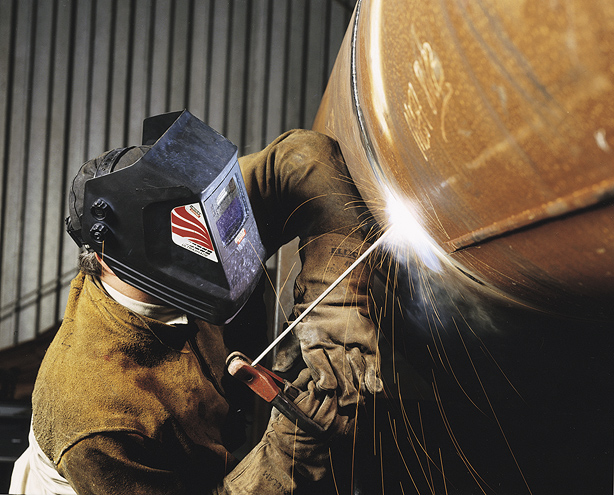MMAW (Manual Metal Arc Welding)
or
SMAW(Shield Metal Arc Welding)
Shield or Manual metal arc welding is a process, in which the heat for welding is generated by an electric arc, established between a flux covered consumable electrode and the workpiece. The electrode rod is made of a material that is compatible with the base material being welded and covered with a flux that gives off vapors that serve as a shielding gas and provides a layer of slag both of which the protect the weld area by atmospheric contamination.
In SMAW both AC and DC power sources can be used. All of them supply the high current used for welding at a sufficient safe lower voltage. The output requires is either AC or DC. Welding current plays a significant role in deposit quality and deposition rate.
In manual metal arc welding, short circuit voltage can fluctuate due to arc length changes. Hence if a constant voltage power source is used, current will fluctuate with arc gap in manual arc welding.
To overcome this problem a constant current power source is used in manual arc welding. In direct current, the current flows continuously in one direction and hence welding arc is relatively steady and smooth. DC is superior to AC especially while welding with lower currents.
Types of welding:-
- Autogenous Welding- It is a kind of welding in which only similar metal parts can be welded. e.g. mild steel to mild steel, brass to brass, copper to copper.
- Heterogeneous Welding- It is a kind of welding in which only dissimilar parts can be welded. e.g. mild steel to copper, cast iron to mild steel, stainless steel to mild steel, etc.
Advantage of Shielded Metal Arc welding-
- This is the simplest among all arc welding processes.
- It is portable.
- This process is the benchmark for all arc welding processes.
- Cost economical.
- This can be used outdoor and indoor.
- Welding can be carried in any position.
- This process finds countless applications because of the availability of a wide range of electrode.
- A big range of metal and their alloys can be welded.
- The power cable of SMAW can be extended, that's why it can be used for long-distance and height process.
Application:-
SMAW is used both in fabrication and maintenance repair job. This process finds application in
- Tank, boilers, and pressure vessel fabrication.
- Shipbuilding
- Pipes and penstock joining
- Building and bridge fabrication
- automotive and aircraft industry etc.
Equipment required for shielded metal arc welding:-
- Arc welding power source
- Welding cables
- Electrode holder
- Earth clamp
- Welding electrode
- Welding helmet and hand shield
- Protective coating including hand gloves
- Chipping hammer, wire brush, etc.
- PPE (Personal protective equipment)
In SMAW both AC and DC power sources can be used. All of them supply the high current used for welding at a sufficient safe lower voltage. The output requires is either AC or DC. Welding current plays a significant role in deposit quality and deposition rate.
In manual metal arc welding, short circuit voltage can fluctuate due to arc length changes. Hence if a constant voltage power source is used, current will fluctuate with arc gap in manual arc welding.
To overcome this problem a constant current power source is used in manual arc welding. In direct current, the current flows continuously in one direction and hence welding arc is relatively steady and smooth. DC is superior to AC especially while welding with lower currents.
Polarity in DC welding:-
Polarity indicates the direction of current flow in the welding circuit.
The flow of electrons is always from negative to positive.
Kinds of polarity
- Straight polarity
- Reverse polarity
Straight polarity:- In straight polarity, the electrode is connected to the negative and the work to the positive terminal of the power source.
Reverse polarity:- In reverse polarity, the electrode is connected to the positive and work to the negative terminal of the power source.
Why polarity is important in welding:
In DC welding, 2/3 of the heat is liberated from the positive end and 1/3 from the negative end. To have this advantage of unequal heat distribution in the electrode and base metal, the polarity as an important factor for successful welding.
Straight polarity is used for:
- Welding with bare light coated and medium coated electrodes.
- Welding the thicker sections to obtain more fusion and penetration.
- Welding of non-ferrous metals.
- Welding with heavy and super-heavy coated electrodes.
- Position welding
- Sheet metal welding
ARC Lenght:-
Arc length is known as the gap or distance between the tip of the electrode and the workpiece during welding.
Types of arc length:
Arc length is known as the gap or distance between the tip of the electrode and the workpiece during welding.
Types of arc length:
- Standard arc length
- Short arc length
- Long arc length
- Good weld joint
- Good penetration
- Maximum strength
- Less chance of porosity
- Metal deposition as per standard
- Maximum ductility
- Lessor no oxidation


No comments:
Post a Comment